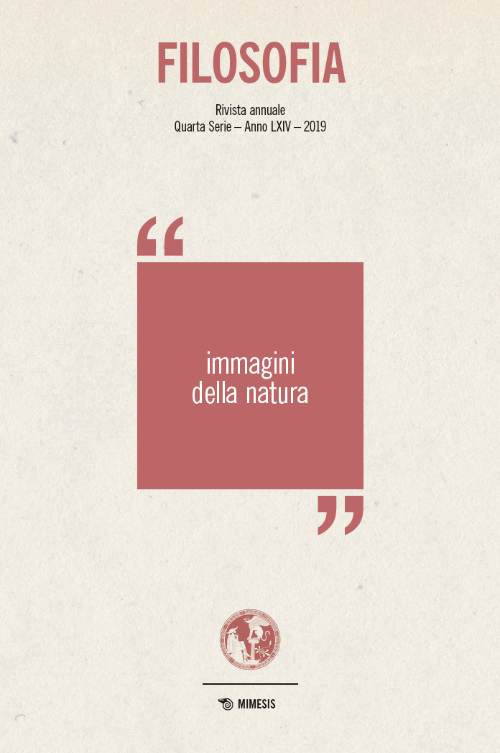The symbolic bond between man and nature
DOI:
https://doi.org/10.13135/2704-8195/4064Keywords:
symbolic bond, nature and culture, necessity and freedom, bodyAbstract
Beginning from the consideration of the ecological and environmental emergency, this article examines the dynamics of man’s relationship with nature. The sense of their interdependence is irreducible to simple human survival and natural self-preservation: human freedom recognizes in natural necessity a model able to limit human congenital defect that is arbitrariness; and, illuminated by freedom, nature reveals a face of its necessity, which is able to get in dialogue with freedom. Their mutual connection is therefore reformulated in terms of symbolic link. It is possible to find examples of symbolic bond in Jean-Jacques Rousseau’s relationship with nature, in its various forms, and with interesting links to contemporary philosophy. The path finally opens up to a reflection on the role of the body, as a turning point between nature and culture.
Downloads
References
H. Arendt, Vita activa. La condizioneumana (1958), tr. it. di S. Finzi, Milano, Bompiani, 1997
H. Arendt, Le origini del totalitarismo (1951), tr. it. di A. Gua-dagnin, Torino, Einaudi, 2004
A. Cook, Jean-Jacques Rousseau and Botany: The Salutary Science, Oxford, Voltaire Foundation, 2012
M. de Certeau, in La scrittura della storia (1975), tr. it. di A. Jeronimidis, Milano, Jaca Book, 2006
J. Derrida, “... Ce dangereux supplément...”, in Idem, De la grammatologie, Paris, Minuit, 1967, pp. 203-234
J. Derrida, L’animale che dunque sono (2006), tr. it. di M. Zannini, Milano, Jaca Book, 2006
J. Derrida, La Bestia e il Sovrano. Volume I (2001-2002) (2008), tr. it. di G. Carbonelli, Milano, Jaca Book, 2009
J. Derrida, La Bestia e il Sovrano. Volume II (2002-2003) (2010), tr. it. di G. Carbonelli, Milano, Jaca Book, 2010
G. Th. Fechner, Nanna o L’anima delle piante (1848), a cura di G. Moretti, tr. it. di G. Rensi, Milano, Adelphi, 2008
S. Freud, Il perturbante (1919), tr. it. di S. Daniele, in Idem, Opere, vol. IX, Torino, Bollati Boringhieri, 2006
M. Horkheimer, Th. w. Adorno, Dialettica dell’illuminismo (1947), tr. it. di R. Solmi, Torino, Einaudi, 1997
E. Husserl, Gesammelte Werke, vol. 4, a cura di M. Biemel, Den Haag, Martinus Nijhoff, 1952
H. Jonas, Organismo e libertà. Verso una biologia filosofica (1994), a cura di P. Becchi, Torino, Einaudi, 1999
E. Levinas, La traccia dell’altro (1963), in Idem, Scoprire l’esistenza con Husserl e Heidegger, tr. it. F. Sossi, Milano, R. Cortina, 1998
Lettera di Paolo ai Filippesi 3, 20
I. Poma, Una genesi ininterrotta. Autobiografia e pensiero in Jean-Jacques Rousseau, Milano-Udine, Mimesis, 2013
I. Poma, L’identità autobiografica, tra verità e finzione. La fantasticheria come prassi filosofica in Jean-Jacques Rousseau, in Sognare la politica. Soggetto e comunità nelle Fantasticherie di Rousseau, a cura di M. Menin e L. Rustighi, Bologna, il Mulino, 2017, pp. 87-109
J.-J. Rousseau, Le fantasticherie del passeggiatore solitario (1782), tr. it. di A. Canobbio, Milano, SE, 2014
J.-J. Rousseau, Le confessioni (1782), tr. it. di G. Cesarano, Milano, Garzanti, 2009
J.-J. Rousseau, Discorsi (1755), tr. it. di R. Mondolfo, Milano, Rizzoli, 2009
J.-J. Rousseau, Lettere sulla botanica (1789), a cura di E. Cocco, Milano, Guerini e Associati, 1994
J.-J. Rousseau, Rousseau giudice di Jean-Jacques. Dialoghi (1782), tr. it. di E. Melon, Grumo Nevano (Na), Marchese, 2014
J.-J. Rousseau, Il contratto sociale (1762), tr. it. di M. Garin, Roma-Bari, Laterza, 2010
Rousseau between Nature and Culture. Philosophy, Literature and Politics, a cura di A. Deneys-Tunney e Y.Ch. Zarka, Berlin-Boston, De Gruyter, 2016
J. Starobinski, Les Amitiés végétales, in Idem, Jean-Jacques Rousseau: la transparence et l’obstacle. Suivi de sept essays sur Rousseau, Paris, Gallimard, 1971
B. Waldenfels, Fenomenologia dell’estraneità, a cura di G. Baptist, Napoli, Vivarium, 2002
B. Waldenfels, Fenomenologia dell’estraneo (2006), tr. it. di F.G. Menga, Milano, Raffaello Cortina, 2008
B. Waldenfels, Estraneo, straniero, straordinario. Saggi di fenomenologia responsiva, a cura di U. Perone, Torino, Rosenberg & Sellier, 2011



